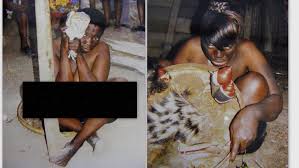
Josphat Mupoko (not real name) from Chinyuni area in Chirumanzu in the Midlands province saved up US$800 to buy two heifers before retiring from the civil service three years ago.
by Stephen Chadenga
Despite the droughts that saw cattle perishing in large numbers in his area in recent years, Mupoko’s head increased to five.
But on Saturday he lost two of his beasts to a gang of witch-hunters calling themselves tsikamutandas who are accusing villagers of possessing goblins before demanding payment in the form of livestock.
The witch-hunters claimed there was a goblin at Mupoko’s homestead.
According to those who attended the cleansing ceremony, one of the tsikamutandas went to a fire place in Mupoko’s kitchen hut, dug a hole and “uprooted” a hairy cow’s horn.
Whether out of fear or in earnest, Mupoko quickly admitted he knew of the “goblin” before the witch-hunter ordered him to surrender two of his cattle in order to be cleansed of the evil object.
When The Standard visited Chinyuni shops last Saturday, villagers expressed mixed feelings towards the witch-hunters who have descended on this otherwise quiet and peaceful rural community.
- Chamisa under fire over US$120K donation
- Mavhunga puts DeMbare into Chibuku quarterfinals
- Pension funds bet on Cabora Bassa oilfields
- Councils defy govt fire tender directive
Keep Reading
Some were saying the tsikamutandas should be allowed to operate in the area while others were opposed to the idea. “These people are looting our cattle, we should never allow them to conduct their suspicious cleansing ceremonies,” said Timothy Masibhamba.
But another villager, Josphat Moyo, was of a different opinion, insisting that the witch-hunters should be allowed to carry out their activities without hindrance.
Moyo claimed there were witches and wizards who were causing sleepless nights in the villages.
Reports indicate that there are two groups of tsikamutandas operating in the area and they have at one point engaged in physical fights for control of the area.
Village head Fanwell Machinja said villagers were divided on the witch-hunting practice with some calling for their dismissal from the area while others said they “cleaned the area of witches”. “People are divided here. Some want action to be taken against the witch-hunters saying they are daylight robbers while others say they should rid the area of witches,” Machinja said.
Unlike in other areas where the tsikamutandas are invited by traditional leaders, in this area they invited themselves and have already established a make-shift base.
After villagers have made their payments in the form of cattle, the witch-hunters transport the beasts to nearby Masvingo town where they sell them at giveaway prices, ranging between US$150 and US$200.
The livestock have a ready market in butcheries operating in the city who are making huge profits from the meat sales. Villagers in the nearby areas say they are living in fear as they anticipate for the arrival of the tsikamutanda in their areas.
In other areas in the province such as Gokwe and Mberengwa, the self-proclaimed witch-hunters have caused havoc in recent years, sowing seeds of hatred among relatives and leaving villagers divided and poor.
Action is rarely taken against the witch-hunters because villagers do not report them to the police, out of fear.











